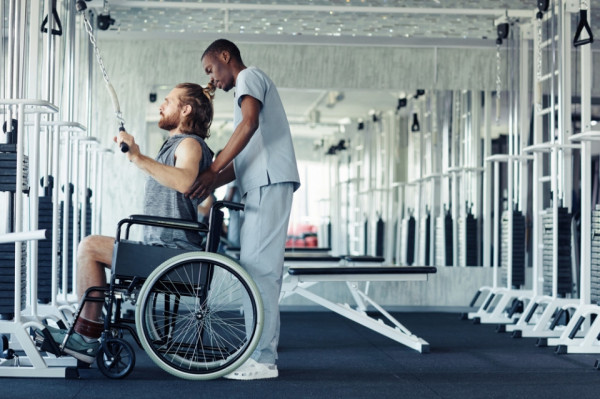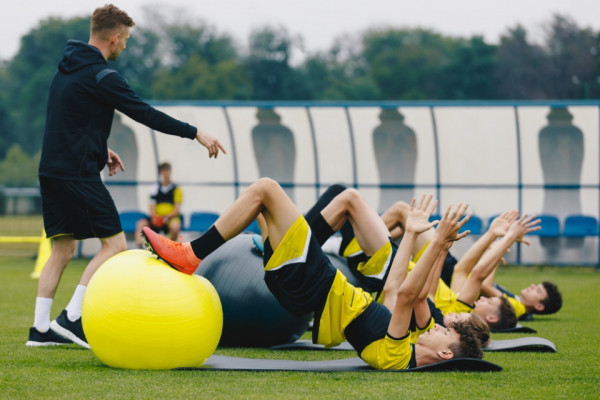
University of Bolton, Deane Road, Bolton. BL3 5AB
Tel:
Email:


“At the University of Bolton, we take great pride in providing a quality, supportive learning environment for our students.”
Professor George E Holmes DL | President & Vice Chancellor
“...tutors are very supportive and you’re not just a student ID number, at this university you are an individual with a name.”
Ellisse Vernon | BSc (Hons) Adult Nursing
Back to menu
Back to menu
Study with an Off-Campus Partner
Back to menu
Back to menu
University of Bolton, why we are the right choice
Location - Bolton, Greater Manchester

12/06/2023
Welcome to the exciting world of sports rehabilitation. It's a world where determination and healing come together to create remarkable victories.
Consider a realm in which athletes face difficult tests, straining their bodies to the breaking point in search of outstanding performance. Despite everything, there is a ray of hope that illuminates the way to healing and rejuvenation. That ray of hope is sports rehabilitation.
Sports rehabilitation is the incredible chemistry that allows players to overcome injuries and setbacks. Sports rehab restores their physical prowess and place in the arena. It is a multifaceted journey that includes many methods, therapies and tactics. These all aim to restore optimal physical functionality and performance.
So come along for the ride as we uncover the mysteries of sports rehab. We will investigate modern treatments and novel medicines. Prepare to get fascinated and stunned as we explore the world of sports rehabilitation and this field’s transformational potential.
What is Sports Rehab and Rehabilitation?
Sports rehab reigns supreme in the world of athletic medicine. It is the guiding light that helps players in overcoming injuries, rekindling their fire and driving them back into the game.
Consider a sprinter whose hopes are dashed by a torn hamstring, a tennis player side-lined by a crippling shoulder condition or a soccer player dealing with a fractured ankle. Whenever a tragedy strikes, sports rehabilitation steps in to provide a ray of hope and healing.
Sports rehab encompasses a wide range of treatments, therapies and tactics. These are specific to the requirements of individual athletes. Physical therapy, strength training and medical therapies are all part of the sports rehab process. All these aim to restore function and improve performance.
Athletes go through a revolutionary recovery process at the hands of capable specialists. They use specific workouts and therapies that help in tissue healing, strengthen weakening muscles and enhance mobility. It's a team effort in which athletes and therapists work together to restore the body's full potential.
But sports rehabilitation covers more than the physical components of recovery. It's a full strategy that recognises the important impact of mental and emotional well-being on an athlete's recovery. Athletic psychologists and counsellors play an important role in guiding athletes through mental challenges during recovery. They help them to develop resilience and cultivate a positive outlook.
The power of sports rehab resides in its capacity to turn failures into victories. Athletes recover from injuries with more strength, motivation and genuine respect for their bodies. It is a testament to the unwavering determination that resides within every athlete; a desire to overcome difficulties and redefine their limits.
What Does a Sports Rehabilitator Do?
Sports rehabilitators are the overlooked heroes of sports rehab. They are the masters that work behind the scenes to guide athletes from injury to victory.
But what is their job to be exact? They are sports rehabilitation experts and possess a wide range of information and procedures for healing and rebuilding damaged bodies. Their speciality is in diagnosing injuries and developing personalised sports rehabilitation treatments. They assist athletes on their path to peak performance through sports rehab programmes.
These specialists assess the degree of an injury with a sharp eye for detail and determine the root causes and potential threats. Armed with this knowledge, they design a schedule that fits the athlete's specific needs, goals and timetable.
The instructors enhance the healing process by combining treatments, manual methods and cutting-edge technologies. They lead athletes through a sequence of workouts that develop strength, mobility and coordination.
They focus on more than the physical healing of sports rehabilitation and understand the complex relationship that exists between the mind and the body. They understand that mental and emotional well-being are critical components of a successful sports rehab journey. Their job is to use psychological strategies to increase motivation, promote confidence and also create resilience in athletes dealing with the emotional challenges of injury.
Furthermore, they serve as a trusted mentor and advocate for athletes, coaches and other professionals. They enable open communication and cooperation and educate players on injury prevention, good technique and maintaining top performance.
The responsibilities of a sports rehabilitator extend well beyond the limits of a clinic or training facility. They serve as pillars of strength, providing encouragement, empathy and a shoulder to lean on. Their commitment to players' well-being creates the incredible comebacks we see on the field.

Is Sports Rehabilitation the Same as Physiotherapy?
Sports rehabilitation and physiotherapy are two phrases that are often used together in this field. But are they the same, or do they have subtle differences so we can tell them apart? Let's go into this interesting issue and discover the reality.
While sports rehabilitation and physiotherapy both aim to restore function and improve performance, they use different approaches. Beyond the field of athletics, physiotherapy spans a wide range of illnesses and patient populations. It focuses on identifying and treating musculoskeletal, neurological and cardiovascular disorders. It works with the goal of improving total physical well-being.
Sports rehabilitation is a discipline that works on just athletes and game-related injuries. It digs deeper into the specific needs and problems that athletes face. It customises sports rehab programmes to improve their athletic performance and allows them to return to their game as soon as possible.
Sports rehabilitation considers the dynamic aspect of sports, in which motions are explosive, agile and unique to the demands of various games. They create protocols that duplicate the intensity and complexity of athletic activities. And they do so to ensure athletes recover their competitive edge.
Furthermore, sports rehabilitation is a multidisciplinary approach that involves many treatments. This includes physical therapy, exercise prescription, game psychology and performance analysis. It also entails working together with coaches, trainers and other healthcare specialists. Together, they’ll develop a strategy that tackles all areas of an athlete's recovery and performance.
While the skills and procedures used in sports rehabilitation and physiotherapy may be similar, the context and focus are quite different. Sports rehab focuses on athletes and the special needs of their games. Whereas, physiotherapy covers a larger range of illnesses and patient groups.
What Are the Five Stages of Sports Rehabilitation?
A transforming journey requires different stages in the field of sports rehabilitation. Each has the potential to catapult players from injury to success. So, let us go into the depths of these stages to discover their fascinating core.
- Stage 1: Rest and Protect
In the first and most important phase of recovery; athletes prioritise rest in this stage. They enable their bodies to recover from the immediate shock of the injury. They shield the damaged region, giving it the space and time it requires to heal.
- Stage #2: Mobility and Movement
The awakening of the body's potential; athletes focus on regaining mobility at this stage. They take part in activities that enhance flexibility and range of motion; taking small measures to regain control and reconnect with their bodies.
- Stage #3: Strength and Stamina
The development of resilience and endurance lies within this stage. Athletes engage in strength training here; strengthening their muscles and increasing their stamina. They recover their physical strength while laying the groundwork for future improvements. They do so with targeted workouts and gradual challenges.
- Stage #4: Reconnecting to Coordination
This stage is all about the harmonious dance of mind and body. Athletes focus on regaining coordination and balance at this stage. They re-establish the ideal link between their minds and muscles. And they do exercises to improve their balance and motor abilities.
- Stage #5: Rebuilding Sport-Specific Technical Movements
The victorious return to their sport; athletes spend time here perfecting sport-specific tactics. They refine motions to recover their competitive edge and embrace the complexities of their games’ domain. They incorporate newly gained strength, mobility and coordination into their performance.

Is Sports Rehab in Demand?
The need for sports rehabilitation has soared in a society driven by the search for athletic success.
Athletes are always pushing their bodies to their limits to outperform past results. With such ambitious goals comes the unavoidable danger of injury; this fuels a surge in demand for rehabilitation services.
The need to recover from injuries, allowing players to return with little delay, increased the demand for sports rehab. Athletes recognise that careful recovery is critical for returning to the game stronger than before. As a result, sports rehab specialists have emerged as vital members of the healthcare team. They are an asset for their skill in restoring functioning and optimising performance.
Furthermore, the globalisation of different games has contributed to an increase in demand for sports rehabilitation. From high-profile competitions to recreational activities, all are engaging in physical pursuits like never before. This increase has resulted in a rise in sports-related injuries thus it has emphasised the necessity for experienced sports rehab professionals.
Athletes have also benefited from developments in medicine and therapy procedures. Sports rehabilitation has changed through state-of-the-art technologies, evidence-based practices and novel treatment methods. The need for these specialised services continues to rise as athletes see incredible recoveries and success stories.
Sports Rehabilitation Jobs:
Calling all game enthusiasts and healthcare professionals! Sports rehabilitation jobs in the UK provide an interesting profession, one that blends your love of games with the healing arts.
The demand for qualified experts is increasing. Athletes in the UK are looking for top-tier sports rehab services to recover from injuries and perform better.
You'll play an important role in injury prevention, diagnosis and treatment in the field of sports rehab. You will make a meaningful difference whether you deal with elite players, teams, or just those pursuing an active lifestyle. The UK offers opportunities for professional growth, with advancements in technology and science. Specialise in areas like musculoskeletal counselling, sports massage, strength and conditioning or gaming psychology to stand out among competitors.
Beyond professional sports, the demand extends to private practices, wellness centres, fitness clubs and community organisations. In the growing field of sports rehabilitation jobs in the UK, you may combine your passion for games with your desire to help others. Make an impression and help the nation's sporting success. Take advantage of the many opportunities and incentives of this exciting professional path!
Conclusion:
Sports rehab is a transforming process that heals and enables players to overcome difficulties. It blends the therapeutic power of athletic medicine with the joy of games. It helps individuals towards a path of recovery and peak performance. Bolton University provides a doorway into the exciting world of sports rehabilitation. We have sports rehabilitation programmes designed to provide you with the information, skills and practical experience you need to make a difference in the lives of athletes.
If you love games and want to help others, this is your chance to start a fulfilling career in sports rehabilitation. Join Bolton University and immerse yourself in a lively learning atmosphere. You will study from expert teachers, use cutting-edge facilities and get hands-on experience through placements.
To learn more about Bolton University's courses, contact us at enquiries@bolton.ac.uk or call +44 1204 903142 to speak to a member of the team. Start your journey towards a rewarding career right away and experience #UniAsItShouldBe!